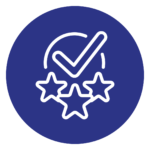Why Being the Best Is No Longer Good Enough
With organisations grappling with ESG agendas and profitability challenges, those who emerge as truly impactful leaders will be those who can be both the best in the world and the best for the world.
For decades, the goal of businesses and their leaders was to be the best in their market or their industry: in essence, “Being best in the world”. Achieving this status meant maximising profits, achieving market dominance, and outperforming competitors. However, in recent years, an additional success metric has risen to the fore: being best for the world.
No longer confined to not-for-profits, business outliers or philanthropic pursuits, leaders are being challenged to achieve financial success in ways that benefit society, the environment, and future generations.
To do this, they must first embrace a different approach to leadership – sustainability leadership. Executive coaching and leadership development have a critical role to play in this transition, so let’s unpack what is sustainability leadership, its benefits, and how executive coaching and development can help leaders and their organisations become both the best in the world and the best for the world.
What is Sustainability Leadership and who are Sustainability Leaders?
Over the last thirty years academics, sustainability experts and a handful of business leaders have focused their efforts on developing the philosophy and practice of leading sustainably and the building the business case for the integration of people, profit and planet into an organisation’s definition of success and cultural DNA.
Organisations such as Patagonia, Unilever and Interface have been forerunners in its practice and impact. Today, as this emerging concept of business success steps into the mainstream, there are several definitions of the type of leadership that is needed to create and embed a culture of sustainability.
One comprehensive definition is by the Cambridge Institute of Sustainability Leadership (CISL:2012) which defines sustainability leadership as “a particular blend of leadership characteristics applied within the definitive context of addressing the sustainability challenges facing the world and our aspirations for a more sustainable future”.
With this context in mind, sustainability leaders are individuals compelled to make a difference. In doing so, they adopt new ways of seeing, thinking, and interacting that result in innovative, sustainable solutions which create value for a variety of stakeholders while driving transformative change beyond the organisation.
Why now?
Today, organisations are navigating a seemingly endless list of disruptive challenges including worsening economic conditions, post pandemic issues, the shift towards increased digitalisation and automation, and the increasingly urgent need to address sustainability and the effects of climate change.
Within this context, some of our economic, business and leadership assumptions and practices are no longer fit for purpose. Those who take the courageous step to adopt sustainability leadership and demonstrate their credentials as the being best FOR the world can reap a breadth of benefits:
 Enhanced reputation and access to customers and investors who increasingly demand a proven commitment to sustainability, including 81% of millennials who expect companies to make a public commitment to sustainability (Nielson Report: 2015), resulting in increased brand recognition, customer loyalty and organisational growth.
Enhanced reputation and access to customers and investors who increasingly demand a proven commitment to sustainability, including 81% of millennials who expect companies to make a public commitment to sustainability (Nielson Report: 2015), resulting in increased brand recognition, customer loyalty and organisational growth.
 Greater employee engagement and motivation by creating a sense of purpose, a positive impact on the planet and society, and prioritising the well-being of employees. This helps attract and retain top talent leading to reduced turnover rates, better decision making and increased productivity, aiding the business’s bottom line.
Greater employee engagement and motivation by creating a sense of purpose, a positive impact on the planet and society, and prioritising the well-being of employees. This helps attract and retain top talent leading to reduced turnover rates, better decision making and increased productivity, aiding the business’s bottom line.
 Elevated innovation and creativity, leading to new opportunities and competitive advantages. In a report by the Business and Sustainable Development Commission (2017), sustainable business models have the potential to unlock economic opportunities worth up to $12 trillion by 2030.
Elevated innovation and creativity, leading to new opportunities and competitive advantages. In a report by the Business and Sustainable Development Commission (2017), sustainable business models have the potential to unlock economic opportunities worth up to $12 trillion by 2030.
 A future-proofed business by addressing long-term risks and opportunities, enabling them to remain competitive and sustainable over the long term while meeting commitments to shareholders and multiple stakeholders, over all timeframes. (Global Reporting Initiative: 2015)
A future-proofed business by addressing long-term risks and opportunities, enabling them to remain competitive and sustainable over the long term while meeting commitments to shareholders and multiple stakeholders, over all timeframes. (Global Reporting Initiative: 2015)
 To transition swiftly and profitably as sustainability goals are defined, measured, and achieved while meeting net zero targets, in a way that enables the organisation to become both the Best FOR the World as well as the best in the world.
To transition swiftly and profitably as sustainability goals are defined, measured, and achieved while meeting net zero targets, in a way that enables the organisation to become both the Best FOR the World as well as the best in the world.
“Sustainability is no longer an option, it’s a necessity”
– Jacqueline Novogratz, founder, and CEO of Acumen.
The critical role of Executive Coaching and Development
Executive coaching and development are powerful tools for developing sustainability leaders and organisations who aspire to become both the best for the world and the best in the world. Many of the problems we face are human problems. Yet, as humans we are not changing fast enough for ourselves, the planet, or future generations. Purposefully working on the psychological dimension of change, through executive coaching and development can help leaders build the mindsets, attributes and capabilities required to unlock the individual and organisational potential which exists to address the risks and embrace the opportunities this challenge presents.

Executive Coaching for a sustainability leadership mindset
Within the context of addressing the sustainability challenges and our aspirations for a more sustainable future, executive coaching provides leaders with a safe space to clarify their purpose and values, identify their current strengths and opportunities. They can also develop greater self-awareness and gain a deeper understanding of the impact of their decisions and ways of working on others and the environment, both within and beyond their organisations.
Most importantly, this safe space also provides an opportunity for leaders to acknowledge their emotions and explore assumptions and biases. Potentially, this can generate an openness within which to develop an inclusive mindset, a holistic understanding of sustainability and its importance and to re-imagine the future.

Fostering the human attributes of sustainability leadership
Sustainability leadership is inherently “human” leadership. The human attributes of humility, appreciation, empathy, compassion, connectedness, courage, optimism, mindfulness, and perseverance are universally quoted as essential for the creation of a culture of sustainability
(IDG:2022). Organisations can ensure their leaders’ wellbeing is supported when they foster these attributes through individual executive coaching, team coaching and development or blended development programs. The development of these attributes will build stronger, more trusting relationships as they engage with stakeholders, build effective teams and drive sustainability initiatives in a meaningful way to make long term change more likely and impactful.

Closing the sustainability capability gap
Many organisations are already investing in closing the sustainability capability gap through a dedicated sustainability leadership development program or by incorporating aspects of sustainability leadership into existing leadership programs. Others are beginning the journey of developing the high-level skills and capabilities required to ensure that their leaders are equipped to navigate the complexities of sustainability. From envisaging an organisation’s sustainability purpose, to creating and executing strategies to achieve this purpose, or measuring their success; leaders need to be able to make sense of the world as an interconnected whole, critically evaluate information, generate new ideas through collaboration, communicate effectively about sustainability, mobilise action and track data-driven decisions. It is through the development of these capabilities that leaders will enhance their sustainability impact, foster an evolutionary cycle of learning, and become the best for the world.
Put simply, today’s leaders can no longer simply opt out of their role in addressing sustainability challenges. Increasingly the stakeholders who support their success expect them to straddle the conundrum of striving to be both the best in the world and the best for the world. Embracing sustainability leadership and engaging with executive coaching and development can support this transition to a more sustainable way of doing business. By developing the mindset, attributes and capabilities of sustainability leadership, leaders can create businesses that benefit both their bottom line and benefits all stakeholders, to create value for future generations to come.
Contact us to learn more about SMG’s approach to sustainability leadership.
References:
Cambridge Institute of Sustainability Leadership (CISL) “The Business of Sustainability: Building Industry Leadership” published in 2012. The report can be accessed online at https://www.cisl.cam.ac.uk/media-assets/our-research/business-of-sustainability-report.pdf
“Better Business, Better World” published by the Business and Sustainable Development Commission in 2017. The report can be accessed online at https://report.businesscommission.org/.
The Nielson Report: “The Sustainability Imperative: New Insights on Consumer Expectations” published in 2015. The report can be accessed online at https://www.nielsen.com/wp-content/uploads/sites/3/2019/04/nielsen-global-corporate-sustainability-report-oct-2015.pdf
Global Reporting Initiative (GRI). (2015). The Business Case for Sustainability Reporting. Retrieved from https://www.globalreporting.org/resourcelibrary/The-Business-Case-for-Sustainability-Reporting.pdf.
“Inner Development Goals: Background, method and the IDG framework” published by Growth That Matters in 2021. The report can be accessed online https://www.innerdevelopmentgoals.org/framework.

Elizabeth Hughes
SMG APAC Relationship Manager & Executive Coach/Facilitator in Sustainability Leadership.








